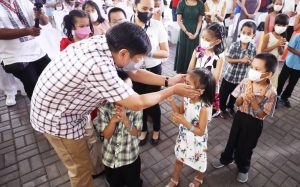Philippine President Ferdinand Marcos Jr. has pledged to pursue a less punitive approach to illegal drugs than his predecessor Rodrigo Duterte, whose violent anti-drug campaign cost thousands of lives during his six years in office.
In a pre-recorded interview with actress and host Toni Gonzaga that aired yesterday, Marcos said that he had established a working group that will chart out a holistic anti-drug campaign. This will focus on prevention and rehabilitation as much as gunning down suspected drug dealers.
“The war on drugs will continue, but we will have to do it a different way,” Marcos said in the interview, his first since winning the presidency by a landslide in May. “In fact, right now, we are trying to formulate what is the best way for the rehabilitation program. These are all being formulated.”
Marcos said that the new-look anti-drug campaign would focus on “the upstream of the problem, the prevention.” It should have a strong educational component, in which children are taught about the bad effects of drugs, while the government would seek to offer proper treatment to drug users.
However, the Philippine leader’s comments stopped far short of any sort of explicit condemnation of Duterte’s bloody campaign, which has claimed untold thousands of lives since its launch just hours after its architect was sworn into office in June 2016. The government itself claims that more than 6,000 people have been killed during the campaign, nearly twice the number who lost their lives during the repressive Martial Law period under Marcos’ father, President Ferdinand E. Marcos. Independent estimates put the toll much higher, anywhere from 12,000 to more than 20,000.
The scale of the violence is such that judges at the International Criminal Court (ICC) in The Hague last September authorized an investigation into the “war on drugs,” describing it as a “widespread and systematic attack against the civilian population.” While Duterte pulled the Philippines out of the ICC’s Rome Statute in 2019, court prosecutors claim that they have jurisdiction over crimes committed between July 1, 2016, Duterte’s first day in office, and March 16, 2019, when the Philippines withdrew from the Rome Statute. (They are also probing killings committed on Duterte’s watch in Davao City, where he first road-tested his violent approach to anti-narcotics policy.)
During his interview with Gonzaga, Marcos repeated his earlier statements that he has no plans to cooperate with the ICC investigation. Last week, his Solicitor General Menardo Guevarra officially requested that The Hague-based court halt its investigation into drug war killings. Guevarra’s office argued that the alleged crimes do not rise to the level of crimes of humanity, and also that an international investigation is not warranted, given that the Philippines is already pursuing its own legal investigations into the excesses of the drug war. Under the ICC’s principle of complementarity, the court only acts in cases where domestic courts are unwilling or unable to do so, a principle that Marcos also referenced during his interview.
“The ICC, very simply, is supposed to take action when a country no longer has a functioning judiciary,” Marcos said. “That condition does not exist in the Philippines. So I do not see what role the ICC will play in the Philippines.” He added, “The alleged crimes were committed in the Philippines. They were all committed by Filipinos. Why will we need a foreigner to tell us how to deal with it?”
This line has a certain nationalist currency, but human rights groups in the Philippines and abroad claim that the investigations into the drug war conducted domestically have been shallow, perfunctory, and involved only a small handful of high-profile cases.
While Marcos’ comments seem to suggest that the Philippines is gearing its anti-drug policy down from a literal war to a metaphorical one, its apparent unwillingness to ask searching questions about its conduct under Duterte casts some doubt on its promise of a “drug war with a human face.”
“Using a drug rehabilitation approach means little when police and mystery gunmen are still executing suspected drug users and dealers,” Phil Robertson of the U.S.-based advocacy group Human Rights Watch said in an emailed statement: “Law enforcers should receive clear orders to stop the ‘drug war’ enforcement once and for all.”
































